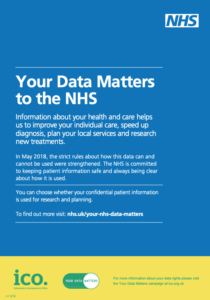We respect your right to privacy and keep all your health information confidential and secure. It is important that the NHS keeps accurate and up-to-date records about your health and treatment so that those treating you can give you the best possible care.
This information may be used for management and audit purposes. However, it is usually only available to, and used by, those involved in your care. You have the right to know what information we hold about you. If you would like to see your records please contact the Practice Manager.
GDPR – General Data Protection Regulation
The General Data Protection Regulation (GDPR) is a new law that determines how your personal data is processed and kept safe.
The regulation applies from 25th May 2018, and will apply even after the UK leaves the EU.
What GDPR will mean for patients
The GDPR sets out the key principles about processing personal data, for staff or patients
- Data must be processed, lawfully, fairly and transparently
- It must be collected for specific, explicit and legitimate purposes
- It must be limited to what is necessary for the purposes for which it is processed
- Information must be accurate and kept up to date
- Data must be held securely
- It can only be retained for as long as is necessary for the reasons it was collected
There are also stronger rights for the patients regarding the information that practices hold about them.
These include;
- Being informed about how their data is used
- Patients to have access to their data
- Patients can ask to have incorrect information changed
- Restrict how their data is used
- Move their patient data from one health organisation to another
- The right to object to their patient information being processed (in certain circumstances)
Information documents:
Childrens Privacy Information Leaflet
Summary care record
There is a new Central NHS Computer System called the Summary Care Record (SCR). It is an electronic record which contains information about the medicines you take, allergies you suffer from and any bad reactions to medicines you have had.
Storing information in one place makes it easier for healthcare staff to treat you in an emergency, or when your GP practice is closed.
This information could make a difference to how a doctor decides to care for you, for example which medicines they choose to prescribe for you.
Only healthcare staff involved in your care can see your Summary Care Record.
Do I have to have one?
No, it is not compulsory. If you choose to opt out of the scheme, then you will need to complete a form and bring it along to the surgery.
You can find out further information or opt out online on this link.
Your Data Matters to the NHS
Information about your health and care helps us to improve your individual care, speed up diagnosis, plan your local services and research new treatments. The NHS is committed to keeping patient information safe and always being clear about how it is used.
How your data is used
Information about your individual care such as treatment and diagnoses is collected about you whenever you use health and care services. It is also used to help us and other organisations for research and planning such as research into new treatments, deciding where to put GP clinics and planning for the number of doctors and nurses in your local hospital. It is only used in this way when there is a clear legal basis to use the information to help improve health and care for you, your family and future generations.
Wherever possible we try to use data that does not identify you, but sometimes it is necessary to use your confidential patient information.
You have a choice
You do not need to do anything if you are happy about how your information is used. If you do not want your confidential patient information to be used for research and planning, you can choose to opt out securely online or through a telephone service. You can change your mind about your choice at any time.
Will choosing this opt-out affect your care and treatment?
No, choosing to opt out will not affect how information is used to support your care and treatment. You will still be invited for screening services, such as screenings for bowel cancer.
What do you need to do?
If you are happy for your confidential patient information to be used for research and planning, you do not need to do anything.
To find out more about the benefits of data sharing, how data is protected, or to make/change your opt-out choice visit: www.nhs.uk/your-nhs-data-matters

